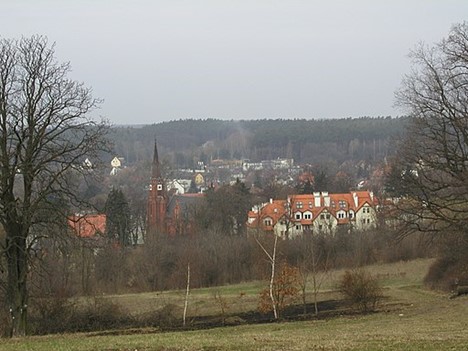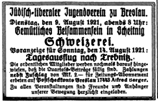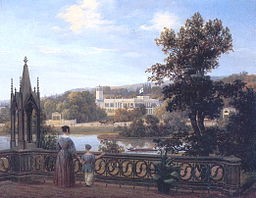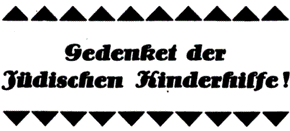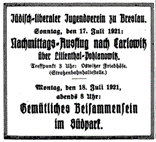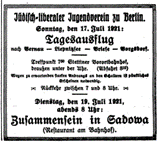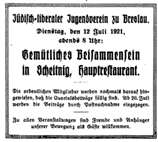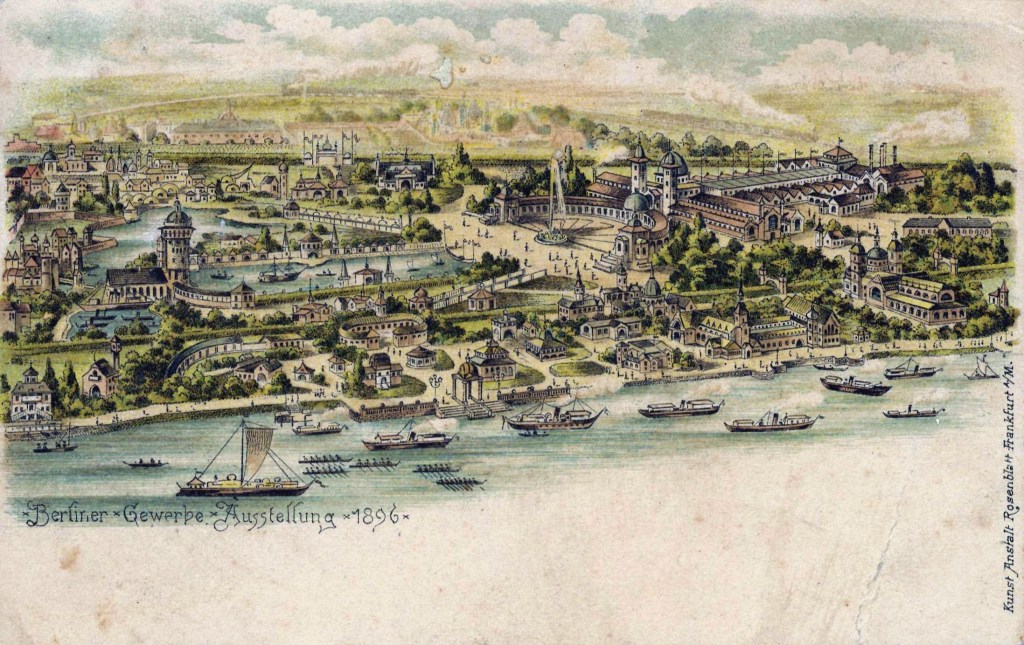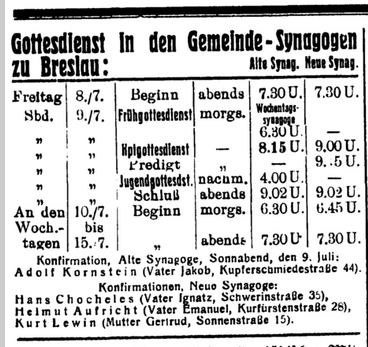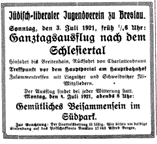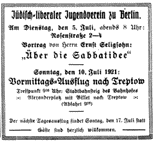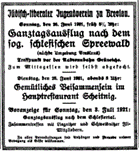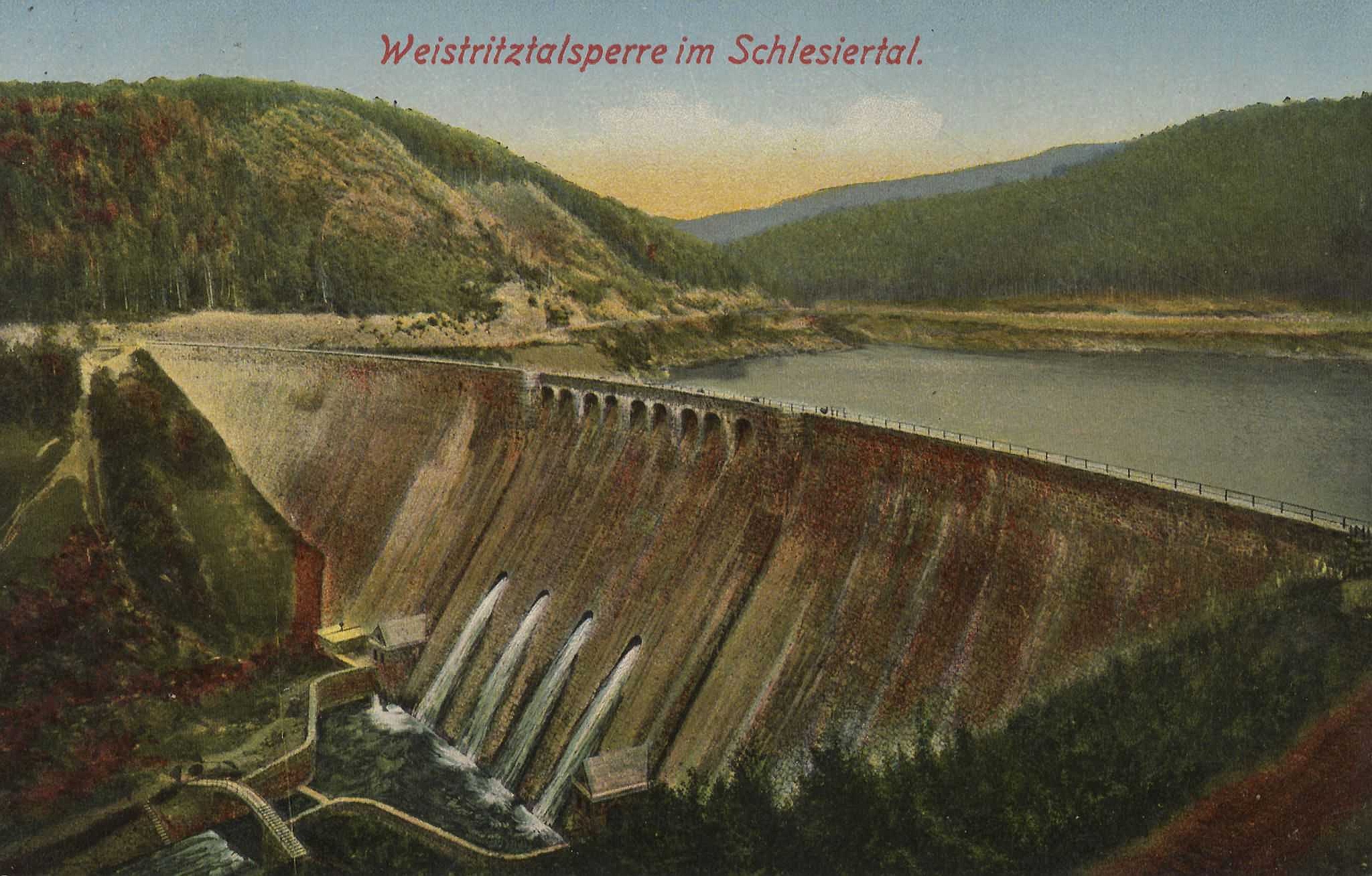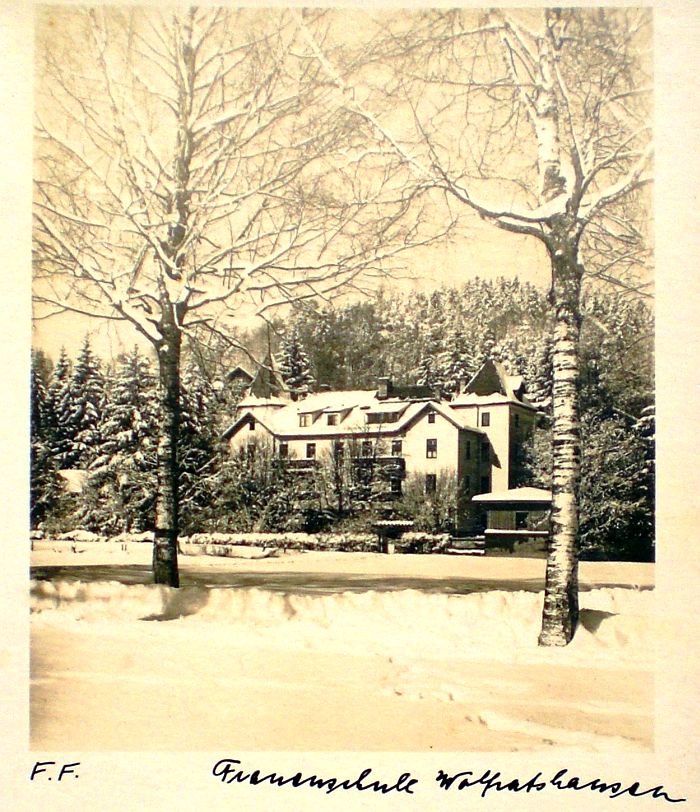Translator’s Highlight:
Rabbi Gottschalk offers a different way to regard spiritual development or progress. He suggests that one might apply the same principle of liberalism that is based on freedom and the right to determine one’s own way in life to one’s spirituality? Liberalism lies in the choices we make about which external customs we keep. With regard to the right of self-determination, it’s un-liberal to treat the things of the soul differently from the laws of the soul and its demands.
Otto Jöhlinger continues his survey of Bismarck’s actions and statements to determine whether he was an antisemite. In this part of his analysis, he recounts Bismarck’s important relationships with Jewish journalists, politicians, and advisors. Bismarck comments on the Jewish foreign politicians and diplomats he meets and notes his respect and appreciation for their talent and diplomatic skills. Jöhlinger observes that the more mature Bismarck increases his support of Jewish citizens’ rights and his public statements about Jews are positive and counter antisemitic attitudes. Jöhlinger is keen to rehabilitate this founding figure of the united Germany to give Jewish Germans another argument for defending their status as being included in the definition of Germany from its outset and being seen as valuable contributors to the new country.
Yet, this issue shows that Jews are besieged by antisemitism. Against the backdrop of defamation and outrages, you’ll read how Jewish communities consider their own well-being and how to sustain two important aspects of religious life–the welfare of rabbis and ritual adherence. news from the area report on the dedication of a new mortuary and the growing availability of kosher meals in vacation resorts. The salaries of rabbis are a major topic at a gathering of representatives from various communities. The inequality of how rabbis are paid has been recognized. A proposal is made to establish a regular salary so that some rabbis are not totally dependent on whatever they might receive from congregants for funerals and other services. Others draw a handsome and regular salary from the community’s administration. Spoiler alert: The proposal is adopted. How much did the endorsement from Rabbi Leo Baeck sway the representatives?
In the categories of outrage and defamation, we learn that a court rules in a minor case that Judaism is not an actual religion. History shows us how this kind of ruling has a ripple effect as the arguments made here are taken up in other cases, eventually to take on a formidable tenet. One of the leading German-Jewish poets, Heinrich Heine, is pilloried by a professor of literature as emblematic of Jewish presence in Europe. A flyer from the Breslau chapter of the German Nationalist Protection and Defiance Federation, an antisemitic, ultra nationalist group, laments the injustices that swastika wearers suffer. It concludes with a threat that Jews should watch out. The irony of antisemites feeling mistreated by Jews was certainly not lost on the readers.
Finally, we see the announcement for Hugo Heilmann’s bar mitzvah.
Articles:
Liberalism and Development by Rabbi Dr. [Benno] Gottschalk, Posen
Bismarck’s Attitude Toward Jews by Dr. [Otto] Jöhlinger (continued)
Jewish-Liberal Youth Organization Outings
Rabbi Dr. Hochfeld’s Passing, Berlin
Rabbis’ Salaries Considered, Berlin
The Jews in Europe: A Speech by Ignaz von Döllinger
Affordable room and board for Jewish religious staff in health resorts, Berlin
A Jewish Renegade as Defense Witness for Dr. Dinter, Kassel
Dedication of the Mortuary in Bad Kudowa
From the Swastika Wearers, Breslau
Hermann Naphtali’s 80th Birthday, Breslau
Circus Angelo, Breslau
Bar Mitzvah Service in the New Synagogue
Liberalism and Development.
by Rabbi Dr. [Benno] Gottschalk, Posen.
He who reads this title will immediately think of one of the main sources that nourishes Jewish liberalism. Because he carries the principle of development that governs all movements of thought over to religion and justifies religion’s existence and because of which the reader creates his demands.
But all that is said so often that it doesn’t need repeating. Something else appears more important to us: not development as a principle of liberalism that must be fought for, but the struggle is about liberalism in development. Our religion comes to mind. When one sees the external forms of liberalism on our names and signs we also see all the things these bring along just because tradition sanctifies them. When one sees how religious services in Reform temples are weighed down even though they have a worthy purpose—just because what is offered is “gray with age,” we dare not ask, “Where is the principle of development? Yes, it’s accepted – but where is the principle of liberalism that is based on freedom and the right to determine one’s own way in life? It lies in the choices we make about which external customs we keep and on the right to self-determination which maintains that it’s un-liberal to treat the things of the soul differently from the laws of the soul and its demands.
These demands can never be measured by the exterior or by external measures, but only by the interior. The religious soul does not ask, “How long is the service?” but instead “How deeply does it affect my inner self, touches me and uplifts me or comforts me and delights me?” There are few prayers and few chants that can do that. The religious soul does not ask, “How old is this custom, how old is this prayer?”, rather it asks whether it still now moves my religious soul. The religious soul does not ask which teaching about actual conditions brought me to more devotion, rather it asks whether devotion brought me principles and inspiration for my life, which strengths did it increase, which feelings did it arouse.
Whoever doesn’t account for the demands of the religious soul, does not at all recognize it. Perhaps he believes in the development as a principle of liberalism but knows nothing about liberalism in development.
Only, it’s not just a matter of forms and customs, but a matter of the source for these, of the concepts of religion and God, a matter of not just the concepts behind them but what religion and God demnd from us. The person who does not see that the souls of thousands of reformed Jews call for freedom and self-determination, but does not want to hear about liberalism in development. Some will not remain uncommitted once they understand true liberalism, or knows the cultural consciousness of the present (which is much more than “modern”) feels fulfilled, will breathe with relief and, now freed, will live with us and work together when we, fully determined, can say with them, “Religion is the power of our hearts—nothing more! God is the power of our souls—nothing else! Nothing outside of us, nothing over us, but always and ever only in us!
Whoever now asks: “Isn’t that going too far” we tell them “You know that development is a principle of liberalism, but liberalism in development is still beyond you. So far beyond that you don’t even grasp that “we don’t want to stay quiet for Zion’s sake!” Out of love for Zion, that is, love for Judaism, that is, love for our religion!
Bismarck’s Attitude Toward Jews. (continued)
By Dr. [Otto] Jöhlinger, Advisory Councilor to the Ministry of Finance, Berlin.
Bismarck took his helpers wherever he found them; he asked them, when he needed them for his own purposes, about their faith or their past. Lothar Bücher (who, certainly, was not Jewish) was a revolutionary of 1848. Nevertheless, Bismarck appointed him to the civil service and kept him until his death, even though, given his entire past, he would hardly have been suited to the Prussian civil service. Another journalist whom Bismarck recruited was Privy Councilor Ludwig [Ernst] Hahn, who came from a Jewish family in Berlin and became head of the Literary Cabinet and editor of the so-called provincial correspondence. He remained Bismarck’s journalistic advisor for a long time, regularly representing his boss’s point of view in numerous official and semi-official notices.
Another journalistic assistant whose talents Bismarck recognized and immediately recruited was Ludwig Bamberger. It was Bamberger who provided journalistic services to Bismarck during the war of 1870 and was called by him to the Prussian headquarters in France. He was also the one who published the first German newspaper on French soil. Later, however, relations between Bismarck and Bamberger loosened, and Bamberger turned to the liberal wing, so political differences finally separated the two men. Nevertheless, Bamberger remained loyal to Bismarck and wrote a beautiful memorial included in a posthumous publication of Bismarck’s writings.
His relationship with [Eduard] Laster, co-founder of the National Liberal Party, followed a similar development. Here, too, they were initially very close. Later, however, the two also grew increasingly distant politically.
Bismarck’s relationships with Jewish financiers are well known. Bismarck first met Baron Anselm Mayer von Rothschild in Frankfurt (Main) at the time when Bismarck was a Bundestag envoy in Frankfurt. Undeniably, Bismarck had great respect for this man, even though he recounted numerous anecdotes about him, in which Rothschild himself, incidentally, loved to joke about himself. Rothschild lived a strictly observant life, and when a dinner was once to be held at Bismarck’s in the presence of the Crown Prince, Rothschild sent his servant to Bismarck beforehand with the request that he be allowed to bring his own meal, which consisted of kosher food. Bismarck recounts how Rothschild gave him advice regarding the sale of securities. Bismarck wanted to speculate; as he says, it was the only time he speculated in securities based on his knowledge of state secrets. He told Rothschild that he intended to sell the paper. Rothschild warned against it. Bismarck went ahead with the sale anyway, and, as he mentions, he regretted not following Rothschild’s advice!
Another financier who had even closer ties to Bismarck was Gerson von Bleichröder, who played a special role in the Bismarck household, primarily because he managed the Chancellor’s private fortune. As is well known, Bleichröder was Bismarck’s financial advisor in 1871, particularly in the area of war reparations. At Bismarck’s suggestion, Bleichröder was raised to the hereditary nobility. A factor in this may have been the fact that Bleichröder had rendered numerous political services, particularly through his close ties to the Parisian banking house of Rothschild. Among other things, Bleichröder frequently relayed political information from Berlin to Paris before 1870.
It was precisely the civil relations between Bismarck and Bleichröder that gave rise to repeated slanders against Bismarck and a leader of the Conservatives, Captain and former District Administrator 0[tto] von Diest-Daber, used the opportunity to first warn Bismarck against his relations with Bleichröder, and finally even to embarrass the old Kaiser and slander Bismarck. The result was a three-month prison sentence. Nevertheless, von Diest-Daber wrote a defamatory pamphlet about Bismarck and Bleichröder in 1897. Bismarck himself described von Diest-Daber’s allegations as slander and often complained about the vile manner in which Mr. von Diest-Daber himself incited hatred against him. He himself stated that von Diest-Daber suffered from “active persecution mania,” that he was compelled to persecute, and that he also had delusions of grandeur. Nevertheless, the antisemitic libel literature has repeatedly slandered Bismarck in the most vile manner because of his relationship with Bleichröder. It is disgusting today to read the writings of Gehlsen, Loë, and others, where veiled hints are made that are not criminally prosecutable. No honest person today doubts that Bismarck’s relations with Bleichröder were entirely upstanding, but in the 1870s, party hatred had produced nasty results. It is common knowledge that it was Bleichröder who finally mediated the conversation between Windthorst and Bismarck. Windthorst did not want to approach Bismarck directly, knowing full well that mediation by Bleichröder would achieve his goal, and he was not mistaken.
Bismarck often met with foreign statesmen of Jewish descent. The most important among them was undoubtedly Beaconsfield (Disraeli). Bismarck held Beaconsfield, who was also a master of statesmanship, in extraordinary high esteem, undoubtedly much higher than all other statesmen, and Bismarck’s accounts of the Congress of Berlin in particular show us the enormous importance Bismarck attached to Beaconsfield’s personality. Moreover, it was Beaconsfield who, at his first meeting with Bismarck (long before Bismarck became a minister), predicted his major role in European political life—quite the opposite of Napoleon III, who proved himself a poor judge of character!
Bismarck also met with Jews among the French statesmen. Here it was Jules Simon, a scholar by training. Jules Simon was the last person to attend an official dinner hosted by Chancellor Prince Bismarck in the Reich Chancellery. According to Bismarck’s opinion, [Léon] Gambetta, as well as [Gyula] Andrassy, with whom Bismarck concluded the triple alliance, were also of Jewish blood.
The question of Bismarck’s attitude toward the anti-Semitic party is a chapter in itself. In the first period, this question was irrelevant. At that time, there was no organized party of anti-Semites. The conservatives were not friends of the Jews, but they were also not the professional enemies of the Jews, as they later portrayed themselves in the anti-Semitic party. In the second period, a separate party emerged: the anti-Semites, who, under the leadership of [Adolf] Stöcker, played a role at court, among others. Bismarck was said to have connections, the existence of which was often unclear. In any case, the fact remains that Bismarck was never an anti-Semite in Stöcker’s sense, not to mention [Hermann] Ahlwardt. The fact that Bismarck initially did not suppress the anti-Semitic movement as some had desired is due to political circumstances. Apart from the Free Conservatives, Bismarck had no party he could count on permanently. The National Liberals were inconsistent, the Center Party was not compliant with Bismarck’s demands, and thus arose the policy of constantly forming new majorities. Bismarck either worked together with the Conservatives, the Free Conservatives, and the National Liberals, or against the Conservatives with the National Liberals
[Outings with the Jewish-Liberal Youth Organization]
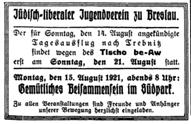
Jewish-Liberal Youth Organization of Breslau.
The outing to Trebnitz planned for August 14 will take place on Sunday, August 21 because of Tischo be-Aw [Destruction of the Temple]
Monday, August 15, 1921 8 p.m.
Social Gathering in the South Park
Friends and well-wishers are always most
welcome to our events.
Jewish-Liberal Youth Organization of Berlin.
Sunday, August 14, 1921,
Morning outing to the Saubucht in Grunewald
Meet at 9:00 a.m.: Zoo station, City platform with a ticket to Grunewald
(Departure at 9:10)
Tuesday, August 23, 8 p.m.:
Social Gathering
Schloss Wannsee near Beelitzhof
(Lake Nikolas station)

and whenever they stood in the way of his policies. He hurled his lightning bolts at all his opponents. To my knowledge, he never once publicly mentioned Judaism or the Jewish press.
One thing is certain: he did not esteem the anti-Semites, and that’s no wonder, for only an exceptional genius could harmonize with a man like Stöcker. He even hated Stöcker in his soul, just as he hated all “politicians in long gowns.” A personal circumstance later came into play. Stöcker belonged to a party that was working toward Bismarck’s downfall and had Count [Alfred von] Waldersee at the ready for this purpose. At one point in “Thoughts and Memories,” Bismarck says:
I have always been suspicious of politicians in long gowns, both female and priestly, and this pronunciation by several hundred Protestant pastors in favor of one of the most frivolous slanders directed against the country’s leading official was not likely to strengthen my trust in politicians who wear a priest’s gown, even a Protestant’s one.
(This refers to the actions of the so-called Declarants, where hundreds of Protestant clergymen renounced Bismarck’s policies in statements published in the Kreuz-Zeitung.) Bismarck soon turned sharply against Stöcker, and it eventually came to open hostility between the two men. Stöcker even claimed that Bismarck had considered allowing him to be expelled, a suspicion that does not seem entirely unjustified. For in fact, Bismarck once had considered the idea—when he found his complaints to the Kaiser about Stöcker fell on deaf ears–of allowing the Socialists Law to be applied against Stöcker.
The last sentence of this letter in particular shows how far Bismarck personally was from the activities of the anti-Semites, who were treated with marked goodwill by [Robert Viktor von] Puttkamer, the then Minister of the Interior, and the Berlin Police President [Guido] von Madai.
More than once, moreover, Bismarck took the opportunity to shake off the anti-Semites and poured bitter scorn on Stöcker, Ahlwardt, and others. In the third period, when Bismarck was in charge of his work, he thoroughly dispelled them. He declared the anti-Semite to be one of the most repulsive phenomena of our time, and moreover, one cannot demand more from a man like Bismarck.
Already as Chancellor, Bismarck left no doubt about his position on anti-Semitism. For example, on April 2, 1881, he delivered a speech that indisputably represented a reckoning with anti-Semitism. This is Bismarck’s speech at the discussion of the Reich budget with reference to the proposed accident insurance law. Eugen Richter had just spoken and pointed out that those conservatives who were instigating the anti-Semitic campaign were in a lively exchange of telegrams with Bismarck. Bismarck first explained in his speech what the telegram was about. He answered thousands of telegrams every day without checking who the sender was, and then added verbatim:
If anyone takes pleasure in portraying me as a member of an anti-Semitic organization, they can have it. As my official position requires, I have refrained from all of these movements, which are not welcome to me. I would only like to hope that the other gentlemen, and especially those who honor the government and me personally with their goodwill, will also refrain more than before from inciting one class against another and from turns of speech that stir up class hatred.
The break between Stöcker and Bismarck had long since been completed when the so-called “funeral-pyres” letter), which Stöcker addressed to the then editor-in-chief of the Kreuz-Zeitung, became public knowledge. In this letter, Stöcker suggested building pyres between the young Emperor and the Reich Chancellor, which would separate them without the young Emperor noticing… — It is understandable that Bismarck could not take a moron like Ahlwardt seriously; he called him a “funny fellow” and a “political tertiary.”
Nothing characterizes Bismarck’s changing stance toward the Jews more than a conversation Bismarck had on January 10, 1871, at headquarters. While Bismarck, as a Junker, had spoken out sharply against civil marriage and in an almost sneering manner about mixed marriage, as the statesman of Versailles, he expressed himself quite differently. The conversation is recorded by [Julius Hermann] Moritz Busch, and since Busch himself is an anti-Semite, there can be no doubt about the accuracy of his portrayal. Busch recounts (p. 31) that the conversation turned to the Jews, and Bismarck then jokingly said that he was of the opinion that the Jews were probably made harmless through crossbreeding. The results of racial crossbreeding were quite good. Bismarck then mentioned several noble families, such as Lynar Styrum and Gusserow, and remarked: “All very clever, nice people.”
Busch then writes: “Then, after some thought and an interlude, he noted that the marriage between distinguished Christian baronesses and rich or talented Israelites, he added:
By the way, it is probably better, conversely, to bring a Christian stallion of German breeding together with a Jewish mare. Money will be able to circulate again, and there is no such thing as a bad breed. I don’t know what I will advise my sons one day.”
Here we find a representation of a thought that Bismarck later expressed in a more eloquent manner on another occasion. In 1892, he said to Hermann Hofmann: “The Jews bring a certain spunk to the mixture of the various German tribes, which should not be underestimated.”
It is known how Bismarck repeatedly and decisively supported the Romanian Jews and how, completely against the will of the surly government, he forced them to grant the Jews equal rights. Of course, neither the humane sentiment of the Reichstag nor any sympathy for the Jews played a role here. Here, it would be political reasons. Bismarck had definite intentions toward Romania, and the Jewish Question served him to achieve his goal. He repeatedly spoke out against the Romanian government when it came to protecting the Jews.
The difference in the attitude of Bismarck during the second period compared to Bismarck during the first period becomes clearly apparent in several speeches. While “Junker Bismarck” had completely rejected equal rights for Jews, it was a matter of course for him that Prussia was a Christian state, the mature state minister took an opposite standpoint, among other things in his speech on January 80, 1872. There he said literally:
As soon as we divide the state into its confessional parts, in which each confession must have its proportional share, the very considerable number of the Jewish population also comes into consideration, the majority of whom are distinguished by their special ability and competence for state affairs.
Bismarck rarely bestowed such an honorable characterization on a section of the population. At the same time, in the same speech, Bismarck distances himself from the standpoint of a confessional state, stating: “A government can only function professionally if it has a state religion. Such a state religion is established.” (Conclusion follows.)
Aus dem Reich.
Berlin. Rabbi Dr. Hochfeld suffered a stroke at the age of 50 while travelling from the Zoo station to Charlottenburg at the start of his summer vacation. The burial rites will take place in the Lützowstrasse synagogue. The funeral service will be held the following Sunday morning at 10:30. Dr. Hochfeld was also an instructor at the College for Jewish Scientific Studies.
Berlin. During its recent meeting, conference of representatives of Jewish congregations discussed the replacement of fees with fixed salaries for rabbis in great detail. Professor Türk (reform) opposed the proposal to continue the discussion in a closed session. This question concerns the whole community and the decades-long administrative practice. Professor Türk explained that ending the fees concerned all parties in the conference. The question was first proposed about twelve years ago in a Zionists’ election and hasn’t been let go since. It was maintained that the rabbis were primarily there for the rich, which Türk denied. There are other reasons for reforming the dependency on donated fees. It’s a great injustice that some rabbis became wealthy from this system of donation-based fees whereas others are paid little for their service. The overworked rabbis must be freed from collecting these fees and apply themselves to more important matters, for true spiritual care and not just performing funerary and burial rites. (continued on p. 3)
The Jews in Europe
A speech by Ignaz von Döllinger on July 25, 1881. Newly published by Philo-Verlag, Berlin 1921.
We have the Philo-Verlag to thank for an interesting, cultural-historical excavation. They have reprinted the valuable and generous historical lecture on Jews by the famous professor of theology from Munich, Ignaz von Döllinger.
[Heinrich] Heine’s pronouncement that Döllinger was meant by “every cotton boll has its donkey.” But that’s certainly not right. More accurate is that the praise of today’s greatest Christian theologians A. von Harnack, who heard Döllinger’s speech in the Munich Academy for Sciences, noted:
Where is there today a second historian who has the same industriousness and insight, to understand foreign attributes, to become completely familiar with the historical texts through the ages as Döllinger? Like with the universal history of the church he seeks to provide an account of not only Germany’s political and cultural history, but of the whole of Europe, even to as far as India!
Döllinger’s works are somewhat outdated and largely forgotten, no longer available in bookstores. This historian is perhaps better known for Heine’s attacks than for his many significant books.
He was born on February 28, 1779 in Bamberg, the son of a famous anatomist and physiologist, J. von Döllinger. After completing his studies in theology and having passed all his exams with the highest distinction—he became professor of church history and church law at the Ashaffenburg Lyceum in 1823. In 1827 he became a full professor at the newly founded University of Munich. At the age of 91 he died there after an extraordinarily productive life dedicated to the religious and political renewal of Catholicism.
Recent research has shown clearly that Heine’s many “fights” with famous contemporaries, as for example, with Platen, started with Heine as the one who was attacked first and he was just defending himself and sought to gain our sympathy for his side as in the battle the great poet fought with the Munich theologian, where he did not act the part of the “misbehaving favorite of the muses.”
The jokes Heine made in his travel journals [Reisebilder] about some of the Catholic mysteries were well aimed to wound some orthodox-Catholic souls. The poet admitted the same for in the second edition of his depictions, he removed the passages.
The attacks Döllinger made in Eos, Munich’s newspaper for poetry, literature and Art in the August 18, 1828 issue on Heine were indeed also hateful and insulting. But one must consider the many, truly mean and base antisemitic insults Heine suffered and give him some understanding when the injured poet goes off the rails when he takes revenge.
In “Ex-Natchtwächter” from the Romanzero collection, Heine makes the academic seem ridiculous:
Apropos! The arch-notorious
Priest Dollingerius—
That’s his name, I think—
Does he still live by the Isar river?
I can’t forget him!
In the pure sunlight!
I’d never seen such an ugly
miserable sinner’s face.
They say he came
Into this world quite wondrously,
Took the back way,
To his mother’s shock and shame.
I saw the pilgrim on Good Friday
In the procession’s train,
Of all the dark men there
He was the darkest one.
That was of course just too much! When Heine applied to do his post-doc in Munich, Döllinger fought against it strenuously. (See Allgemeine Deutsche Biographie, Vol. 48, p. 3).
Whoever wants to learn more about this long forgotten, today quite comical, feud should read Karpeles’ Heine biography, Leipzig 1899, p. 114 and J. Freidrich’s collected Döllinger works, Vol. I, p. 207. There you’ll find everything in more detail.
We recognize from the newly reprinted Jewish lecture by Döllinger that he was certainly not the “repulsive clown” that Heine made him out to be, but rather a great and right-thinking historian.
The talk about the “History of Jews in Europe” held in the Academy of Sciences in Munich is an unprejudiced journey through the terrible history of Jewish suffering. Already in 1849 when Döllinger was an elected representative in the Bavarian parliament, he argued for the complete emancipation of Jews. He must have already worked on Jewish history, for his extraordinary knowledge of the fate of this unfortunate people comes to the fore in his later speech.
His taking of the Jews’ side isn’t due to some sort of philo-semitic impulse but dictated by his sense of justice. At the start of his speech he sharply decries some of the supposed flaws of Jews such as fanaticism and self-promotion. Here he clearly exaggerates (cf. the well-known book by Professor Berliner).
Then he describes the fate of Jews since the destruction of the temple. He refers to many documented points of evidence how they were exploited by lords and kings over the centuries, how because of being prohibited from participating in civil life, Judaism was made to seem like a socio-pathological condition. He told of the countless attacks by the upper class and the lower-class folk. Organized by historical epochs, he ascribed the rulers’ and the folk’s drive to persecute Jews to medieval superstition. In short, he unrolls the Jews’ entire trail of sorrow before our eyes with shocking openness and rightly calls it the ”most awful drama that world history has ever seen.”
He concludes with his hope for better times and ends with the wonderful words from Sophocles’s Antigone: “Not to hate, but to love am I here!”
The honorable old man’s hopes have unfortunately not been fulfilled until now; we live in a new flood of the most idiotic Antisemitism and from Munich we hear some distressing stories of the activities of the local knights of the swastika.
All the more, we Jews must the recognize the love of truth and justice shown by the exceptional Bavarian church historian.
There are countless more comprehensive, better and more thorough historical overviews of the Jews’ sad history, but such a short, meaningful, and clear walk through world history is seldom attempted in a lecture.
We want to lay a wreath on the grave of this courageous professor who spoke such in the Bavarian Academy of Sciences and give heartfelt thanks to the Philo-Verlag for its reprint of this excellent speech. Dr. L.[udwig] D.[avidsohn]
______________________________________________
Aus dem Reich, Berlin
[continued from p. 2]
Professor Türk, who spoke on the issue, noted that the abolition of the rites is on the agenda of all parties in the Representatives’ Assembly. The issue was first broached about twelve years ago at a Zionist agitators’ meeting and has not been settled since. It has been claimed that rabbis primarily serve the rich, a view the speaker disputes. There are other reasons for reforming the rites-based system. It is a monstrous injustice that some rabbis become wealthy through the rites, while others receive no equitable compensation through their salaries. The overburdened rabbis should be freed from the rites, and their energies should be freed for more important tasks, for genuine pastoral care that does not consist solely of wedding and funeral orations. The rabbis’ field of work are social welfare and religious education in secondary schools. The final impetus for discussing this issue came from the letter from Rabbi Dr. Baeck. The work was interrupted by the war. As a result of lengthy deliberations, a mixed commission proposed abolishing all financial relationships between rabbis and the communities.Going forward, communities are to pay a certain amount into the communities’ treasuries for the rabbi’s services, two-thirds of which goes to the rabbis and one-third to the community. A guarantee fund will be established for those rabbis who receive few fees for services. True pastoral care can, in fact, only be exercised if all financial relationships cease. The rabbis have already given their approval to the new regulation. It is therefore to be hoped that the ideal goal of freeing rabbis for higher duties will be achieved. — Attorney Stern (liberal) expresses his satisfaction with the proposal, which protects the rabbi’s feelings, which can be violated by a “donated” fee, and thereby enhances the ideal connection between rabbi and community. – Mr. Kirsten, on behalf of the communities’ boards, expresses his agreement that the proposal will be approved unanimously in the assembly as well as in the mixed commission. He thanks the community rabbis for agreeing to this regulation by waiving a legally binding right. According to the new regulation, every community member will still be free to turn to a rabbi of their particular trust. After some further comments from the assembly, the proposal was unanimously adopted.
At the February meeting of the Representatives’ Assembly, the Zionist side, during the resolution on subsidizing the College for Jewish Science, requested that the Orthodox rabbinical seminary in Berlin also be granted a contribution equal to the amount granted to the College. This request was postponed for business reasons because no request from the rabbinical seminary was submitted and the basis for calculating the subsidy was lacking. In the meantime, the subsidy request from the rabbinical seminary has been received with a detailed justification, which shows that of the rabbis trained in the seminary, 26 are employed in Berlin, four of whom are employed by the Jewish community. The seminary’s budget, which amounted to 45,000 marks before the war, has grown to approximately 280,000 marks; in the past year, the income amounted to 125,000 marks, compared to 223,000 marks in expenditure.
The municipal council proposed an annual contribution of 20,000 marks for the institution. — The Representatives Assembly considered this proposal at its last meeting. The speaker, Medical Councilor Dr. Steinthal (liberal), recommended acceptance of the proposal on grounds of fairness. As the first speaker, Professor Dr. Türk (liberal) objected to a statement made during the previous discussion by representative Dr. Abrayam Löb (First Vice President), who had declared that he was not able to vote for the subsidy for the liberal College for the Science of Judaism. According to these statements, Professor Dr. Türk, as Dr. Löb’s religious opposite, is unable to vote for the subsidy for the Orthodox rabbinical seminary. He does not deny the rabbinical seminary’s right to exist; as a liberal, he believes that both schools of thought have their full justification. However, he accuses the rabbinical seminary of fostering a spirit of intolerance it fosters in its students. The rabbinical seminary and the Adass-Yisroel community have repeatedly and disastrously interfered in the development of the greater Berlin community: For example, in the question of employing a school inspector for the community, then in 1912 with the planned expansion of the community administration through the proposed increase in the number of members of the executive board and the Representatives Assembly, and more recently with the creation of the comprehensive organization of the Jews of Germany, whose development is seriously endangered by the stance of Orthodoxy. From all these considerations, the speaker concludes that it is necessary to speak out personally against the adoption of the proposal. Attorney Stern (Liberal) comes to the same conclusions as the previous speaker and declares that he will abstain from voting. The rabbinical seminary cultivates a spirit of intolerance and denial of any other view; it denies the legitimacy of liberal development in Judaism and has never shown parity toward liberal demands. Dr. Neumann (Conservative.): Maintaining parity is not the concern of the institutions, but the task of the community administrations. The subsidy application submitted at the time was also intended to work in the spirit of this parity. After the Conservatives voted without hesitation to subsidize the liberal college for the science of Judaism, they expect the Liberals to also support the conservative institution. Professor Dr. Loewe (First Vice President) explains that the community has an obligation to provide for both institutions, since each of these institutes represents a necessity for Judaism. Dr. Abrayam Löb (First Vice President) asks that fundamental questions, such as the position towards liberal and orthodox Judaism, not be decided by vote. History will decide the worth or worthlessness of both directions. Medical Councilor Dr. Steinthal (Liberal) also opposes abstentions. It is a matter of promoting science [knowledge], regardless of who is pursuing it. The Berlin community, which comprises almost half of all German Jews, is obliged to support both schools of thought. After a correction by the representative, Professor Dr. Tűrk the session ended. The board’s proposal for an allocation of 20,000 marks for the rabbinical seminary is adopted by 10 votes to 2, with 2 abstentions.
Berlin. Affordable room and board for Jewish religious staff in health resorts.
The Central Committee for Jewish Welfare in Frankfurt am Main recently proposed the following to the Central Welfare Agency of German Jews in Berlin:
As a result of the current economic conditions a large part of the middle class, especially the religious staff, teachers and cantors can no longer afford to go to a health spa or cure resort when they are ill for the prices of room and board are simply too high for their income levels. Efforts should be made to arrange that the health facilities in the spa towns offer midday meals at wholesale cost. The Central Welfare committee of the German Jews joined with the Association for Ritual Dining in Hamburg to survey the kosher restaurants in their area. The results were favorable. The hotels and restaurants in nearby resort towns have said they are prepared to offer at-cost prices (or discounted rates) for meals: Baden-Baden, Bad Brückenau, Bad Kreuznach, Bad Mergentheim, Bad Nauheim, Bad Renndorf, Bad Orb, Bad Teichenhall, Segeberg, Bad Tölz, Wiesbaden, Wildbad, Bad Wildungen.
For additional information, contact the Association for Ritual Dining, E. B., Hamburg, Königstrasse 21/23.
Kassel. A Jewish Renegade as Defense Witness for Dr. Dinter.
Following our report on the blasphemy trial of the all-too-well-known Dr. Dinter, a sometime colleague aptly illuminates the peculiar role played by an editor, a baptized Jew, in the proceedings before the Kassel Criminal Court. On July 11 of this year, according to our source, the trial against Dr. Dinter for blasphemy took place before the Kassel Criminal Court. At a meeting the previous year, he had spoken of the Jewish God as a businessman enthroned above the clouds and had criticized the Old Testament Scriptures—especially the prophets. They described them as journals of Jewish racketeering and fraud, and claimed that the Kol Nidre prayer permitted Jews to commit any kind of perjury or fraud. In the trial before the criminal chamber, the editor Dispeker, who had followed Dinter’s statements from the press table, was also heard as a witness. He confirmed that those statements had been made. When asked by the presiding judge whether he had personally taken offense at them, whether he had found the statements blasphemous, this man, who had been Jewish just six years earlier, could only reply that he had not seen any blasphemy in them. I could only admit that strongly religious people must have felt that Dinter’s words were blasphemous; he was not sufficiently religiously inclined to be outraged by such turns of phrase. Dispeker denied any knowledge of the Kol-Nrdre prayer and vigorously emphasized his Protestant faith. Everyone who attended the hearing had the impression that Dispeker was primarily trying not to reveal anything about his Jewish past. — But in vain! —Deeply ashamed, he had to confess in response to Dinter’s question that his ancestors (!) were of the Semitic race. This is the behavior of a Jewish renegade who, despite all his negative religious orientation, considered it necessary to convert to the Protestant faith. While another witness, a dissident, in whose veins hardly any Semitic blood circulates, stated that he, as a human being, was outraged by Dr. Dinter’s blasphemous speech, a former Jew and now Protestant Christian could not admit that his human sensibilities had been affected in any way. And such a man is a welcome guest in certain Jewish social circles—only in such circles. It is shameful, deeply shameful for those Jewish circles, that need the intellectual sparks of such a man to give their social gatherings a “higher tone”—even if those are just well-told—Jewish jokes.
Lebens=Erinnerungen einer alten Frau. A memoir by Regina Neisser
Dedication of the Mortuary in Bad Kudowa
On August 3, the Chebra kadisha in Bad Kudowa held its general assembly at which the newly built mortuary was ceremoniously handed over to the community. The Chebra was founded five years ago by spa guests who wanted to build a mortuary for sick guests and a place where a worthy service could be held during the high season. The war caused the construction to last until now. The mortuary is about ten minutes away from the spa town’s main square on a gentle hill guarded by trees. It can hardly be seen from the street and only the gilded Star of David shines over the trees. After the builder, Master Builder Prinz from Breslau made a short speech and gave the head of the Chebra, the optician Dr. Josef Schlesinger (Breslau) the keys to the mortuary, the latter invited the many guests to celebrate the dedication. He based his speech on the Schehechejonu. He noted the members of the Chebra board who had died in the last five years, the brothers from Posen and West Prussia whom the war had taken away from us, and expressed the hope that at least our Upper Silesian brothers will fare well and remain close to us German citizens of Jewish faith. Then he thanked everyone who had supported the construction, the general contractor, the craftsmen and workers, Bad Kudowa’s civic administration kindly accommodated deceased Jewish spa guests in their mortuary, and the representatives of the synagogue communities of Breslau, Glatz, Gleiwitz, Tarnowitz, Kattowitz, and Beuthen, as well as the Bne Briss order who had come to the celebration. He wished that the mortuary be only rarely used, but in case it becomes necessary, that it would not be a place of despair, but a source of comfort and the assurance that the death was in accordance with God’s will.
With that he handed the hall’s key to Rabbi Dr. Ellguther (Neisse or Reisse) who opened the doors and performed the dedication worthily. After a presentation of a psalm by Cantor Wartenberger (Breslau) he described the Jewish virtues that led to the hall being built: love, loyalty and unity. After him, Kudowa’s mayor, Dr. Schindler, and the general director of the spa’s administration, Mr. Offenberg expressed the hope that one of the next goals of the Chebra would be building a house of God in Kudowa. The uplifting ceremony closed with a German song by Cantor Wartenberger.
In the general assembly that immediately followed, the board was unanimously re-elected. The chairman, Dr. Schlesinger declined to be re-elected, was then replaced by Mr. Wolf Gottheiner from Breslau. Additionally, a committee sitting in Kudowa and under the leadership of the health spa’s doctor, Dr. Cohn, which should address the Chebra’s local matters.
In the evening a celebratory dinner attended by many was held in Pollak’s restaurant. In a perfectly formed, intelligent and humorous speech, Rabbi Dr. Lewin (Kattowitz) honored the Chedra’s board and drank to the future flourishing of the association. Dr. Schlesinger (Breslau) dedicated his glass to the representatives from Kudowa’s community staff. In a charming manner, General Director Offenberg responded and expanded with an assurance that Kudowa’s spa directorship and the community administration would take pains to make Jewish guests’ stays as pleasant as possible. About 65% of the spa’s guests were Jewish, but the number of complaints from the Jewish guests made for a small number of the complaints that the director received. That would indicate that the Jewish guests felt good about Kudowa. He promised to continue to strive to make their stay in Kudowa pleasant. That’s why the community administration will give the Chebra its fullest support if it takes on building an admirable synagogue. Rabbi Dr. Ellguther’s naming the former chairman, Dr. Josef Schlesinger, an emeritus member and chairman, was met with applause from all. An auction of the benchen took in 765 marks for the Chebra. The respectful and in-every-way successful celebration will certainly leave a lasting impression in the hearts of those who attended.
Breslau.
From the Swastika Wearers.
Foerder, the lawyer, sent us a flyer that came to him from the German Nationalist Protection and Defiance Federation, Breslau chapter. Here is its content:
Attacks on the swastika!
Our members continuously report that men and women who wear the swastika are bothered, scolded, threatened, and physically attacked by Jews who even steal the swastika. We have already brought a number of these attacks to the courts.
We now make you aware that the swastika is an “historic Germanic symbol of well-being: and that we as Germans make our German heritage and attitude known by wearing the swastika.
Wearers of other symbols, especially the Jewish Star of David, have never been bothered by our side.
As Germans, we claim the right to wear our German symbol in public.
In light of the many cases that have occurred, we warn you that assaulting wearers of the swastika in any form will force us to take defensive measures.
German Nationalist Protection and Defiance Federation
The following handwritten note was added:
Germans showed the whole world not only courage but true heroism on the front. The Jews? Etappe, homeland, etc. The reproach that the German folkish were “cowardly” will be proven wrong and in full daylight.
[Editor’s note:] It is probable that the flyer was sent following an appointment with the Schoeffengericht where the leader of the local German-folkish group was accused of harm last Saturday. The German Nationalist Protection Federation’s defense attorney, Schmidt, thought his argument was completely political but followed the usual antisemitic themes, until the head judge told him to stay on the matter at hand.
A flyer with the same content has also fluttered across our editor’s desk. However, the handwritten message is “Cavete Judaei!” [Jews, take heed!]
80th Birthday. Mr. Hermann Naphtali, Körnerstraße 46, recently celebrated his eightieth birthday. We wish the active supporter of our movement best wishes.
Circus Angelo. The Circus Angelos has set up its traveling circus on the right bank of the Oder next to the Kaiserbrücke for its Breslau shows. These have already started with a good, nicely executed program. The much-celebrated director and equestrian, Carl Strassburger Jr. displayed his brilliant horse act with truly excellent dancing horses that certainly deserved the laurels they’ve collected. On the tightrope, the foxtrotting Joe Gilbert executed incomparable artistic stunts like headstands, somersaults, and dancing. The gymnastics performed on the backs of proud horses in the double-joockey act was one of the most enjoyable circus acts. As an entre-acte, a group of moody clowns terrified the audience with jousting that included a creative act where riders tried to knock top hats off each other’s heads. The Spanish riding act by Will and Wine had buffalo and horses performing. A light fairy making serpentine movements on the back of an illuminated white horse made for a colorful effect. The artistic part of the show was brought by the Aregos acrobats and their springboard stunts, the gymnastic ladies’ troup “Three Rostocks”, and the fire-breathing human volcano. The program offered so much and such high quality performances; and its harmlessness makes it something that families and children will certainly enjoy. The special family performances take place at the same time as the daily 7:30 p.m. evening show and on Sunday at 3:30 in the afternoon. F.A.K.
Bar mitzvah Service in the New Synagogue.
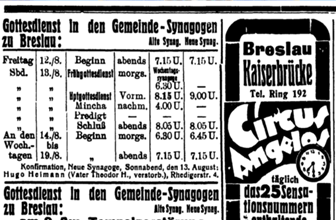
New Synagogue
Hugo Heimann (son of Theodor H., deceased) Rhedigerstr. 4.
[Announcement from the board of the synagogal community]: The Jonas Hirschel estate will provide support for poor Jewish craftsmen and small businesses. Those receiving this money are bound to repay it once they are in a better situation. Applications must be submitted by September 1.
Advertisements
Link to the newspaper’s last page.


